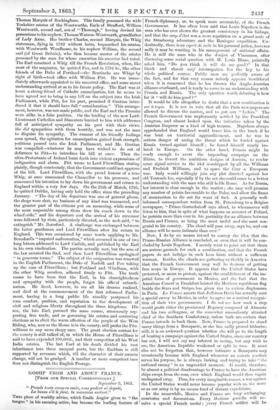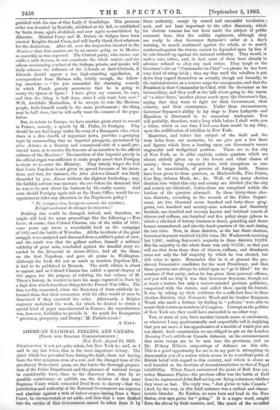GOSSIP FROM AND ABOUT FRANCE.
[FROM OUR SPECIAL CORRESPONDENT.]
September 3, 1863.
" Prends toute cause en main, sans pudeur ni degodt, La bonne s'il le faut, la mauvaise surtout."
THIS piece of worldly advice, which Emile Angier gives to " the tongue" in his amusing satire, has become the leading feature of French diplomacy, or, to speak more accurately, of the French Government. It has often been said that Louis Napoleon is the man who has ever shown the greatest consistency in his failings, and that the coup (tacit was a mere repetition on a grand scale of the Strasbourg adventure and the Boulogne expedition. Un- doubtedly, there is an esprit de suite in his personal policy, however sadly it may be wanting in his management of national affairs. He is still the man who in the donjon of Vincennes, after discussing some social question with M. Louis Blanc, pointedly asked him, "Do you think it will do me good ?" In that blank and almost nail interrogation lies the key to his whole political course. Public men arc perfectly aware of the fact, and for that very reason nobody appears bewildered when it is rumoured that he has thrown the Anglo-Austrian alliance overboard, and is ready to come to an understanding with Prussia and Russia. The only question worth debating is how far it n will do him good ?"
It would be idle altogether to doubt that a new combination is sur is tapir. It is not in vain that all the Paris newspapers are allowed to discuss the matter, and to put out " feelers." The French Government was unpleasantly nettled by the Frankfort Congress, and almost looked upon the initiative taken by the Austrian Emperor as a kind of high treason. Napoleon always apprehended that England would leave him in the lurch if ho was bent on territorial aggrandizement, and he was in serious danger of seeing the threat which he hurled against Russia turned against himself ; he found himself nearly iso-
lated in Europe. On the other hand, Prussia might be ready enough to avert the impending campaign on the Rhine, to thwart the ambitious designs of Austria, to render some signal service to the idol worshipped by all the Williams and Fredrick Williams, and to spare the Czar a European war. Italy would willingly join any plot directed against her old Teutonic foe, especially if by the act she could come to a better understanding with the man who still holds Rome. As for Russia, her interest is clear enough in the matter ; she may well promise any number of points favourable to the Poles, and allow the flame of insurrection to die out for want of fuel. A generally well- informed correspondent writes from St. Petersburg to a Belgian newspaper, " Prince Gortschakoff says aloud, to whomsoever will listen to him, that in spite of what happens on account of Poland, he persists more than ever in his partiality for an alliance between Russia and France, as being the most useful and the most con- genial to his country. The cloud will pass away, says he, and our alliance will be more intimate than ever."
Now, I do by no means intend to convey the idea that the Prusso-Russian Affiance is concluded, or even that it will be con- cluded by Louis Napoleon. I merely want to point out that there are serious grounds for such a combination, and that the French papers do not indulge in such keen hints without a sufficient warrant. Besides, the clouds are gathering so thickly in America that the French Government may well be desirous of getting free scope in Europe. It appears that the United States have protested, or mean to protest, against the establishment of the im- perial form of government in Mexico, and the fact that the American Consul in Frankfort hoisted the Mexican republican flag beside the Stars and Stripes has given rise to serious displeasure in Paris. La France asserts that Jefferson Davis has actually sent a special envoy to Mexico, in order to agree on a mutual recogni- tion of their two governments. I do not see how such a step would profit either the provisional Regency composed of Ahnonte and his two colleagues, or the somewhat anomalously situated chief of the Southern Confederacy, unless both are certain that France intends to back them. Now, France is prepared to stand many things from a Bonaparte, as she has sadly proved hitherto ; still, it is an awkward question whether she will go to the length of bearing a campaign against the United States, since our country has not, I will not say any interest in seeing, but any wish to see, the American Republic weakened or split in two. It must also not be forgotten that, however intimate a Bonaparte may occasionally become with England whenever an entente cordiale serves his purpose, he is always lurking and trying to take "the national enemy" in an unguarded moment. It would, therefore, be almost a political disadvantage to France to have the American ships swept from the seas, over which England would then regain undisputed sway. 'Thus, for every imaginable reason, a war against the United States would never become popular with us, the more so as our army is by no means fond of distant expeditions.
In the meanwhile, Mexico and France are busy exchanging courtesies and decorations. Every Mexican guerilla will re- ceive a special French medal ; :every French soldier will be gratified with the star of Our Lady of Guadalupa. This precious order was founded by Iturbide, abolished at his fall, re-established by Santa Anna, again abolished, and now again re-established by Almonte. Marshal Forey and M. Dubois de Saligny have been created Knights Grand Cross, and will hardly thank their admirers for the distinction. After all, even the despatches inserted in the
Moniteur hint that matters are by no means going on in Mexico
so smoothly as was expected. The Clerical party, who crown our soldiers with flowers, do not constitute the whole nation, and the odious overbearing conduct of the bishops, priests, and monks will daily enhance the influence of the Liberals or Anti-Clericals, if Liberals should appear a too high-sounding appellation. A correspondent from Habana tells, wittily enough, the follow- ing anecdote : — " Do you remember the charming comedy in which Punch gravely announces that he is going to marry the Queen of Spain? I have given my consent, he says, and thus the thing is half done, since I only want hers now."
Well, Archduke Maximilian, if he accepts to rule the Mexican people, finds himself nearly in the same predicament ; the thing may be half done, but he will sadly want the consent of the popu- lation.
But, to return to Europe, we have another great event to record
in France, namely, a speech by M. Fialin, dit Persigny. Why should he not feel happy under the sway of a Bonaparte who, when there is a dire dearth of important news, provides a gossiping topic by commanding that an imperial panegyric, pronounced by fidus Achates in a literary and commercial club of a small pro- vincial town, is to receive the honours of an insertion in the official columns of the 211oniteur? The insertion of this Imperial parody in the official organ was sufficient to make people assert that Persigny is about to re-enter the Ministry. They utterly forget the fact that Louis Napoleon is not given to spread forecasts of his inten- tions, and that, for instance, the fidus dchates himself was lately discarded by Pius ./Eneas without the slightest foreboding ; nay, the faithful servant was unaware the eve before his dismissal that he was to be sent about his business by his crafty master. And even should Persigny again rule at the Home Office, would his re- appointment infer any alteration in the Napoleonic policy?
" Ne craignez lien, bourgeois ennemis des sinistres ; s'agit seulement de changer les ministres."
Nothing else would be changed, indeed, and, therefore, we
might still look for mean proceedings like the following :—You know, of course, that Colonel Charras, one of the exiles of 1851, some years ago wrote a remarkable book on the campaign of 1815 and the battle of Waterloo. All the incidents of the great struggle were analyzed and discussed from a soldier's point of view, and the result was that the gallant author, himself a military celebrity of great note, concluded against the fanciful story re- corded in the Memorial de Sainte-Bike, laid all the blame on the first Napoleon, and gave all praise to Wellington. Although the book did not as much as mention Napoleon III., it had to be published in Brussels. The sixth edition is about to appear, and as Colonel Charms has added a special chapter of 100 pages, for the purpose of refuting the last volume of M. Thiers's history, he wanted to have his maps engraved in Paris by a high firm which does these things for the French War Office. The firm readily consented, when the Secretary of State suddenly in- formed them that their connection with his office would at once be dissevered if they executed the order. Afterwards, a Belgian engraver undertook the work, for which he desired to obtain a special kind of paper manufactured in France ; the manufacturer was, however, forbidden to provide it. So much for Bonapartist " greatness, prosperity, and liberty," hi. Plain's triad e !
A GAUL.































 Previous page
Previous page